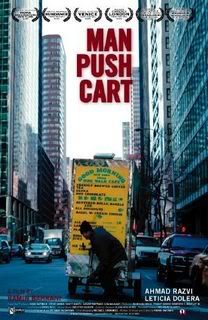 Adil Najam
Adil Najam
A movie based on the life of a fictional former Pakistani rock star who now sells coffee from his push cart on the streets of Manhattan, with a Pakistani-American playing the lead role, has emerged, according to Dennis Lim of the New York Times as “among the most striking American independent movies of the past year” (video trailer below).
He is not alone is lavishing uncommon praise on the independent film ‘Man Push Cart’, produced by Nuroz Films, written and directed by Iranian-American Ramin Bahrani, and with Pakistani-American Ahmad Razvi playing the lead role. Roger Ebert, the doyen of US film critics, says: “I loved it…it is an experience.,” and Alex Crawford of the BBC calls it “a terrific film, with acres of heart and humanity.”
According to the movie’s website:
Man Push Cart tells the story of Ahmad (Ahmad Razvi) a former Pakistani rock singer who ekes out a living selling coffee and donuts to morning commuters from his push cart in Midtown Manhattan. Ahmad supplements his income by selling bootleg porn DVDs, carefully saving his money to afford a place where he might be able to live with his estranged young son. It is a harsh, often humiliating life, but Ahmad carries on with a stoic dignity and sensitivity, seemingly determined to find his way. Then the dull routine of his life is brightened by two developments: the arrival of a young Spanish woman (Leticia Dolera) working down the street in a newspaper kiosk; and an offer of assistance from a wealthy fellow Pakistani (Charles Daniel Sandoval), who remembers Ahmad’s former life as a rock star.
While Ahmad strives to pursue these two new possibilities at a better life, the film returns regularly to the act of him setting up his cart in the early morning darkness: his preparations for opening, the other immigrants who prepare the city in middle of the night, his exchanges with his customers as they buy coffee, tea and bagels from him. This gives Man Push Cart a deliberate rhythm as it explores the complex and hidden depths of the character, who we learn is desperately hanging on to his small dreams in the midst of grief and despair. The denouement of the film is utterly heartrending, yet inevitable. Ahmad’s momentary glimpse of an escape from a circumscribed world closes down again and he has to pick himself up and focus on the same things he started with.
The film was completed in 2005 and has been on the ‘film festival circuit.’ It recieved the Critics Award at the London Film Festival, the Audience Award at the Thessaloniki Film Festival, and Ahmad Razvi received the Best Actor Award at both the Thessaloniki and the Seattle Film Festivals. While these are not the most important of such festivals, these awards are noteworthy for a small independent film and for a debut actor. Although the film did not receive any award at the 2006 Sundance Film Festival (the most important event for this genre), it recieved much critical acclaim and good reviews.


It opened commercially last weekend in New York and will open on the West Coast and elsewhere next week. No word yet on whether it will also be seen commercially outside the US, including in Pakistan.
The movie is not as much about Pakistan as it is about the immigrant experience. It is, however, an experience shared by many Pakistani-Americans. The movie is also about New York City and the particular and peculiar milieu of humanity that this city is. Ultimately, it is a movie about fighting, in this case unsuccessfully, to free oneself of the confines that fate has bound one in. In that sense, it is a movie about a human experience the is not confined to either just Pakistani-Americans nor just immigrants.
Ahmad Razvi’s low key but intense and natural acting is being greatly lauded. However, it did not always come naturally. He jokes:
Sometimes Ramin [the director] would yell at me, ‘Stop acting cool! This is not a Bollywood film!’ he always wanted me to do less, to be still.”
On Razvi, the film’s promotional material says:
Over the last decade, Ahmad Razvi has been involved with a number of businesses in Brooklyn including a construction company, a Pakistani restaurant, and a pastry shop. After the events of September 11, 2001, Ahmad co-founded the Council of Pakistan Organization (COPO). Based in his Midwood Brooklyn community, COPO has already taught tens of thousands of South East Asian immigrants ESL and basic computer courses as well as provided them with pro bono legal services and counseling. In 2002, Razvi initiated a youth basketball program for young adults of all races, religions, and ethnicities. But before all this, Ahmad worked as a push cart vendor on the streets of New York. Man Push Cart is his acting debut.
I met Ahmad Razvi a few years ago while researching for my new book on Pakistanis in America to talk about COPO. I was mesmerized by his dynamism and commitment and in the book I point out that COPO was amongst the most effective Pakistani-American organizations in the US in the aftermath of 9/11. I must confess, however, that I could not have imagined that he would take his obvious charisma and dynamism in this direction. I wish Ahmad the best of luck and am anxiously waiting to see the movie on a theatre screen.



















































Bilal, no I am quite sure this has nothing to do with Salman and having been in contact with him recently I can assure you that he is not pushing carts in New York but moving his music and activism to a new plane ;-)
alvipervaiz, as the Director pointed out, this is in the shadows of 9/11 but not about it at all and the issues of Muslims in USA after 9/11 is NOT its theme itself. It is much more about the struggles of an immigrant, who in this case happens to be a Pakistani and a Muslim. Personally, I am glad it treats its subject as a human being rather than just as an artifact of the ‘post-9/11’ world.
Eidee, my friend, I know this is not the intent of your comment and I see where you are coming from, but allow me to push on the idea you introduced. And, please, I understand that this was NOT what you were implying. I think celebrating the lives and struggles of the Taxi Drivers and Burger Flippers is not bad. The dignity and diligence that they apply to their work is worth celebrating and is, to me at least, as much a source of pride as any other. To the extent that I want Pakistan and Pakistanis to have a positive image, I wish that image is of hard work, diligence, and dignity in the face of hardship. I think at least the character here exemplifies that.
Given that Salman Ahmad of Junoon is now living in NYC, doing things other than rock music, the movie somehow makes me think of him. The actor even looks a bit like Salman. Was there a connection?
Ok, I admit. Salman’s brother, Sherry, himself found the parallel striking.
Dr. Najam,
Thank you for introducing Ramin Bahrani & Ahmad Razvi to us. We are looking forward to see this collaborative art work of these two Americans—one of Iranian and the other of Pakistani heritage, respectively. We also hope that this is only the first of their many future efforts together. Also thank you for the link to the related article by Dennis Lim. He writes: Bahrani was motivated in part to capture the anxiety and self-consciousness of being Muslim-American in the age of Patriot Act detentions.”I didn’t want to make a message movie, but this paranoia had to be part of the film,” he said. How true. We the Muslim-Americans of Pakistan, Iran and Afghanistan origins are collectively facing new challenges in the post 9/11 world. We need to answer these challenges together. I hope this movie is a good start.
Coming that from Ebert it means something. To save time and money he has been my only yardstick for buying movie tickets or renting for many years and I have rarely been disappointed. Will see this one.
this seems interesting…but I’m not sure why all such works feel compelled to reinforce the stereotype of the cab driver, burger flipper, etc.